United Arab Emirates -

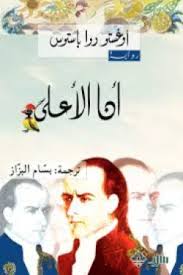
The Supreme, as an eternal dictator, wants the only voice heard in his country to be his own, and for all his subjects to follow the path he has set, because he is certain that this is their destiny. But what will happen when he wakes up one day and finds a leaflet posted on the door of the cathedral, written in the form of a decree issued by the dictator himself, instructing the people to hang his head after his death on a pike in the public square, and calling for the killing of all his aides? Will the Almighty succeed in finding out who wrote this post and punishing him? In this novel, Augusto Roa Bastos gives free rein to the character of José Gaspar de Francia, who ruled Paraguay with an iron fist for nearly three decades, to narrate and dictate, ask and answer, tell stories and incidents, and judge situations and people, in a frenetic narration and a genius, competent construction. This novel is among the 100 most prominent works of literature written in Spanish.
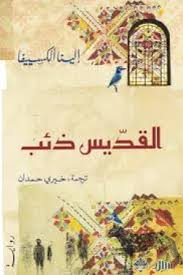
A train traveling with a single passenger is forced to stop for an entire hour, so the traveler leaves it and walks to waste time, but the paths lead him to a coal mine, then to a gypsy wedding, and finally to a place where five wolves were trapped, to carry out a plan targeting the village and its residents. In an interesting plot, this novel pulls you in and carries you away without leaving you any chance to escape, as you follow the trail of this mysterious strange man and wonder: Who is he? A saint who came to save the village and its residents? Or just a mentally ill man running away with his madness? Or a philosopher? Or all of these together? With linguistic and psychological intensity, Elena Alexeeva writes a novel that stands on the border between dystopia, magical realism, and absurdity, drawing inspiration from all of them without drowning in any of them. Therefore, in the year following its publication, it deserved the 2019 Novel of the Year Award and the National Book Center’s Feather Award.
By Antonio Scarmetta/Translated by: Ammar Atassi
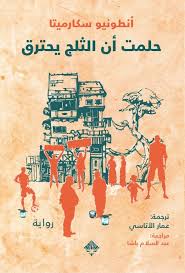
Under the roof of a modest hostel in a poor neighborhood in the Chilean capital, a strange group of guests meets, including workers, trade unionists, students, traffic police, and performance artists. Let them all witness the last days of the rule of the Popular Union headed by Salvador Allende, before the bloody coup led by General Pinochet took place and changed the history of Chile forever. Thus, this hostel turns into something similar to an operations room through which some Chilean leftists try to protect the socialist government and stand up to fascism. And among all of them, Arturo, the braggart and virginal football player, coming from the south to the capital, and burdened with dreams of fame and unsatisfied desires, tries to discover himself and determine his position on everything that is happening around him. “I Dreamed That the Snow Was Burning” is the first novel by Chilean writer Antonio Scarmeta, and one of his most important works. In it, the features of a special, diverse style are established in terms of rhythms and narrative techniques, in which imagination blends with reality, and in which sarcastic humor alleviates the harshness of dramatic events. The book is a living document of the dialogues, conflicts, and popular mood that prevailed in Chile at the most pivotal moments in its history.
By Bertrand Russell/Translated by: Gibran Khazal
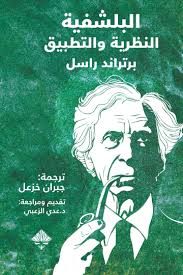
In 1920, the British philosopher, logician, and mathematician Bertrand Russell traveled on a short visit to Russia, a trip that brought him a lot of frustration, and later made him one of the most prominent critics of Bolshevism, or the “Russian experiment in communism,” without this meaning that he abandoned his support for socialism as an idea. Or a political approach. In the first section of this book, Russell records his direct impressions of that visit, in the form of journalistic observations carried out by a committed leftist and first-class philosopher. While the second theoretical and philosophical section is devoted to presenting his main criticisms of Marxism and Bolshevism. Such as criticizing the Marxist philosophy of history, the psychological motives that drive man according to Marx, criticizing the Bolshevik vision of democracy, and refusing to repeat the Bolshevik experience in the West. Russell presents his ideas to the average reader in a smooth manner without this meaning that he abandons the depth of treatment. Russell's experience and his relationship with a revolution he believed in and witnessed its failure may inspire many. Because it teaches them that changing the world for the better comes through honesty and criticism, and through learning from mistakes, and understanding those who committed them with idealism and courage.
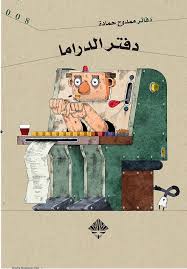
Life is a drama, and drama is a drama within this drama, and most of it talks about this drama that emerges from it, and the process of acting is the enemy of this drama. The more we are honest in presenting this drama, and the more we are spontaneous, the more we seem real, and the exact opposite is true. When you look like you are acting, you will be closer to failure, and farther away from the audience’s love. Even a clown must clown with sincerity and spontaneity that makes him appear real. Our example is Charlie Chaplin, who used clown tools in all his roles that people know, and the audience interacted with the humanitarian issues that he raised and sympathized with them. . We all know that what is presented on the screen are nothing but events that have no basis, so we think, but why do we follow them if we believe that? We follow it because we are in fact the heroes of this drama: its author, director, actor, and the rest of its makers speak in our name, act for us, and represent us at the same time, and when we follow them we are watching ourselves, or details from it. This collection presents a group of stories that attempt to approach the worlds of drama in one way or another, in writing and acting.
By Eduardo Galeano Translated by: Saleh Secular
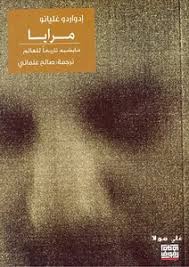
In his book “Mirrors,” Eduardo Galeano retells the history of human civilization in his own way, condensing what he finds exciting, funny, and worthy of attention through brief, precise passages that give the reader the opportunity to connect with the events and facts he reads, as if history were resurrected before him. The author adopts a cornological path in narrating a history based on bitter paradoxes, and stops at cities, personalities, events, and inventions that constituted milestones in human history. This is how we see him moving lightly between various topics; Such as female circumcision, silkworms, beer, Santa Claus, tango, the torture instruments of the Inquisition. But through the illusion of dispersion, he somehow makes history more logical and full of bitter irony. With extreme selectivity and absolute freedom, Galeano, with his extensive knowledge, chooses the points that stand out to him that seemed to him pivotal in the path of humanity, specifically the forgotten events or people that the dominant narrative of history ignored and wanted to erase from collective memory, as if he was saying to the world: “See your true face reflected in... Mirror".
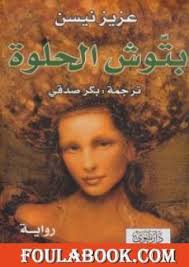
Sweet Batush, Batoul, Turkish Comfort, Mrs. Hard Coin, different names for one woman whose trace has been lost, and finding her alive or dead has become necessary so that her family can obtain a large estate inherited by the mysterious woman; The journey to search for her becomes an opportunity to discover the secrets of the high society of which Batoul was once a part. It is a journey of ups, downs, and transformations of a woman who manipulated everyone and took revenge on them in order to avenge an injustice after she hid a mysterious secret behind her captivating laugh. In this book, Aziz Nissin directs his harsh criticism to expose the “rot” that has befallen the velvety layers of society, and the opportunism, vulgarity, and absence of values that prevail in them, but he does so by mocking the situations and paradoxes that make men blind their eyes to what they do not want to believe, and voluntarily surrender. To the deceptions and vicissitudes of a sweet Kaptosh playful girl.
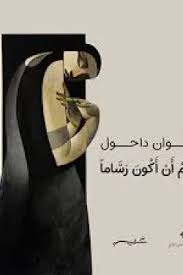
Only fourteen pages, or perhaps a few lines are enough. A different and dangerous experience until I know which is more important: what we said so that it would be very simple memoirs suitable for publication, or what we said over long periods, most of which was not for publication. Like life, all details are important, but what we leave behind is just a small trace.
By George Orwell / Translated by: Uday Al-Zoubi Moayed Nashar
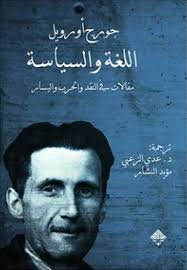
These Orwell essays are written with a direct and frank practical breath. They are not purely intellectual or academic articles. Quite the contrary, Orwell wants the reader to engage in intellectual, and therefore political, battles - as he does not distinguish between the two matters. On the other hand, the articles are very entertaining, smart, and mean. Journalistic writing, for Orwell, is a special literary project. Orwell makes the art of the essay a renewed field for discovering the meaning of writing, and his articles are taught in English universities and institutes as a model of serious, literary, profound, and artistic writing.
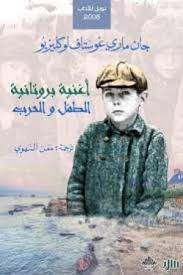
978-9933-641-97-9 Summer harvest seasons, the colors of rivers, fish and stones, the warmth of celebrations in a small village, a wheat field facing the ocean, and the gentle touch of a small octopus on a bare foot... images that Le Clezio conjures from his early childhood in the region. Brutani, breathing life into it, with a captivating narration, before moving on to tell about his first encounter with war, hunger, and anxiety in the city of Nice. In this book, the French writer Jean-Marie Gustave Leclezio goes beyond recounting memories, to approach the war and its lasting impact on his childhood, trying to understand the mysterious void it leaves inside everyone who lived through it, and then deeply explains the cultural and historical nature of the “less fortunate” cities in France, It entangles you in love with cities you have never visited
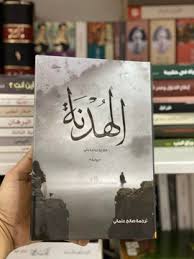
A special kind of anxiety grips Martin Santome after he approaches retirement age. He sees that his life has passed without him achieving anything worth mentioning. However, something changes after hiring the young woman, Abeyanda, in the office where he works, as he suddenly experiences feelings of happiness. After his life had deprived him of her for many years, since the death of his wife and his having to raise his children alone. Through Santome's diaries over the course of an entire year, Benedetti depicts for us the life of the middle class in Uruguay, expressing with great sensitivity the loneliness and lack of communication, love, happiness, and death, in a poetic narrative that qualifies this novel to be one of the most beautiful and powerful love novels. And elegance in Latin American literature.

It happens that a story creeps into your depths, shaking you violently and challenging you to turn away from it. This is exactly what happened to me with the story of the Nightingale. The truth is that I did everything in my power not to write this novel, but my research into the subject of World War II led me to the story of the young woman who made an escape route from occupied France, and I could not escape from it. Thus, her story became the starting point, and in reality it is a story of heroism, risk, and unbridled courage. I could not distract myself from her; I kept digging, exploring, and reading, until this story led me to other stories that were no less amazing. It was impossible for me to ignore those stories. Thus, I found myself under the weight of one question haunting me, a question that remains as valid today as it was seventy years ago: Under what circumstances would I risk my life as a wife and mother? More importantly, under what circumstances would I risk my child's life to save a stranger? This question occupies a major position in the novel The Nightingale. In love, we discover who we want to be; In war, we discover who we are. Perhaps sometimes we do not want to know what we can do to survive our lives. In war, women's stories have always been ignored and forgotten. Women usually return home from the battlefields, say nothing, and then move on with their lives. The Nightingale is a novel about these women, and the bold choices they made to save their children and maintain the lifestyle they had become accustomed to. Kristen Hannah
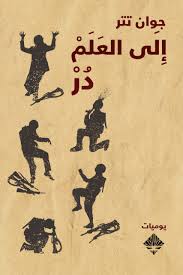
Joan Tatar's memory falters on scenes that Syrians experienced in the laboratory of their torment. It is the slow Syrian time that brings and brings with it in Tatar’s diary the various elements of the experience: starting from the market, to the soldier, to being discharged from it, in a biography that contradicts time, from symbolic death to symbolic birth, in a country that resembles a long dormitory crowded with people. Throughout this cycle of Syrian life, murmurs and stinks are present. Life, as Joan Teter portrays it in this book, is an experiment with low sounds that end in final silence. An experiment with the depths of fear. Is it deeper than we imagined? Is it possible to escape from the fear that has become part of water, and from thirst, part of glut, and part of hunger? Many opposites meet on that distant horizon that made the Syrian dough in the soldier’s laboratory. Were they prisoners or soldiers? Are they condemned or heroes? Everything is equal, all values are equal in that horizon which is the space of Syria, the space of fear and pleas for freedom.
كتاب إسلاموفوبيا في أمريكا لياسر البحري -- الكتاب يلقي الضوء على مشكلة الاسلاموفوبيا المتزايدة في أمريكا، والتي تؤثر على حياة الملايين من المسلمين
. حين تكون الحقيبة المكتظة بالأوراق على كتف الرجل.. أثقل من وزنه.. هذه ليست قصة ساعي البريد؛

Enter your address and we will specify the offer for your area.